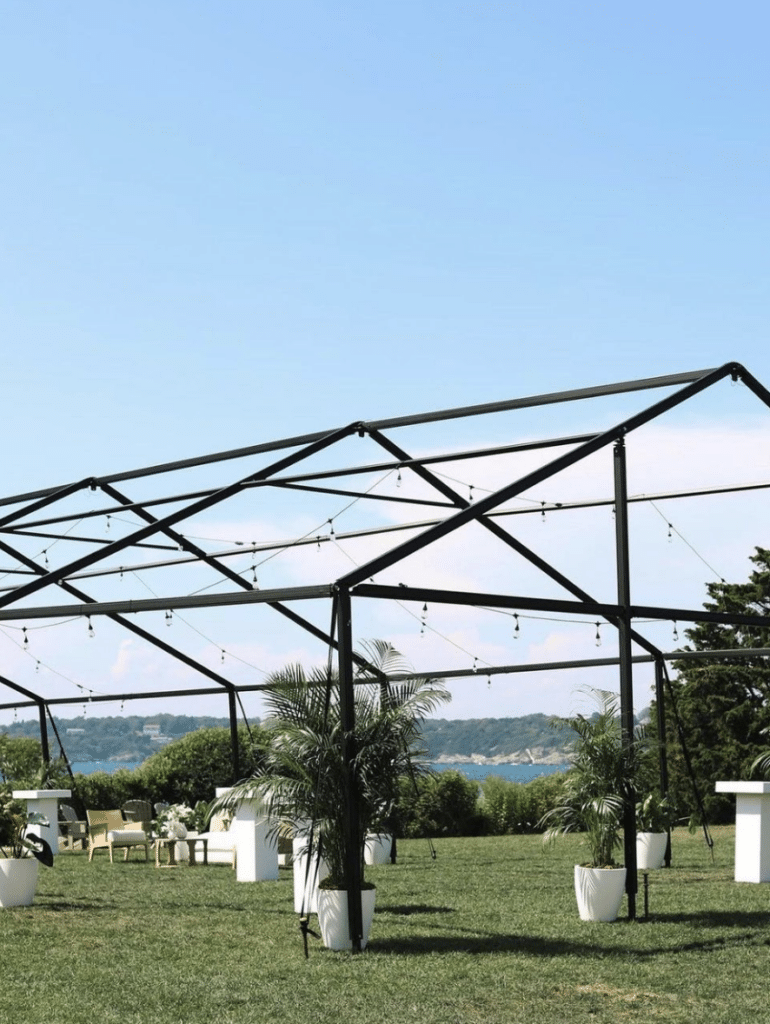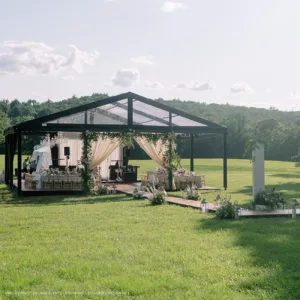Tent Talk: 25 Questions to Ask Your Tent Vendor
Planning a tented event comes with a unique set of logistics, and asking the right questions from the start can make all the difference. Whether you’re planning a backyard wedding, a corporate gala, or a large-scale celebration, understanding what goes into tent rental pricing, permitting, and site logistics is key to avoiding surprises later on. That’s why we created the “25 Questions to Ask Your Tent Vendor” checklist – a free, expert-backed guide to help you compare quotes, identify red flags, and feel confident in your planning decisions. Before you book, be sure you’re asking all the right questions.
What Affects Tent Rental Pricing?
Tent rental costs can vary widely depending on the size, style, location, and complexity of your event. Some of the biggest factors include:
1. Guest Count + Event Layout
More guests = more space.
But size isn’t just about how many chairs you’ll need, it also depends on your layout. Are you including a dance floor, lounge area, multiple bars, buffet stations, or a stage? All of that affects square footage and, in turn, the size of the tent.
2. Tent Style
Not all tents are created equal.
From elegant sailcloth canopies to clear-top frame tents, the structure you choose can influence both the look and the price. Specialty tents or custom shapes typically come at a higher cost.
3. What’s Going Under the Tent
Think beyond the canopy.
Tent rentals often involve much more than the structure itself, like flooring, lighting, temperature control (AC/heaters), and draping. These interior elements add comfort and style, but also add to your budget.
4. Site Conditions + Access
Every site is unique.
A flat backyard lawn? Easy. A sloped hilltop with limited access? That requires more time, equipment, and sometimes special anchoring. The complexity of your install (and how early we can access the site) affects labor needs and overall cost.
5. Permitting + Engineering Requirements
This one’s a biggie…and often overlooked.
Many towns and cities require permits for tented events, especially for larger structures. Some even require site-specific engineering, stamped architectural plans, or additional inspections. At PEAK, we handle all permitting and documentation on your behalf—but fees vary by location, so they’re listed as a line item in your quote.
So… What’s Included in the Price?
When you partner with PEAK, we walk you through the full scope of your tenting needs. Our tent rentals typically include:
A dedicated Project Manager
Complimentary site visit (as needed once you’re moving forward with PEAK)
Sidewalls
Coordination of DigSafe and permitting*
*Permits are not “one price fits all,” so we quote them separately based on your event location’s requirements.
When Should the Tent Go Up and Come Down?
When planning a tented event, timing isn’t just a detail, it’s a key part of ensuring a smooth, stress-free, and cost-effective setup. The general rule? The earlier, the better. For a Saturday event, setup might begin as early as Tuesday or Wednesday, depending on the size and complexity of the build. Large-scale installations, such as those for galas, weddings, or nonprofit fundraisers that require street closures, can sometimes begin 10 or more days in advance to allow for proper staging, weather contingencies, and vendor coordination.
If your timeline is tight, such as an overnight flip between events or a same-day breakdown after the last guest leaves, expect that it may require additional crew and labor, which can increase costs. These condensed schedules demand precision and extra manpower to meet strict deadlines.
The best approach is to plan well in advance and work closely with everyone involved: your venue, planner, vendors, and even local municipalities (especially if permits or street closures are required). By aligning all schedules early, you not only reduce last-minute stress but also give your event team the flexibility to deliver a polished, seamless setup.
Not sure how much setup time you need? Contact us to talk through your venue’s logistics, we’ll help you find the most cost-effective plan.
Will My Tent Be Staked or Weighted Down?
One of the most common questions we get is: Will my tent be staked or weighted down? The answer depends entirely on your site. Every location is unique, and we assess a few key factors to determine the safest and most effective way to secure your tent.
There are two main options for anchoring tents: staking and ballasting. Staking involves driving metal stakes into the ground, while ballasting uses heavy concrete blocks to weigh the tent down. (We don’t use water barrels, ever.)
Here’s what we look at to decide which method is right for your setup:
- Terrain – Grass, pavement, gravel, or other surfaces all play a role.
- Underground utilities – If there’s septic, irrigation, or anything else below the surface, we avoid staking.
- Access and layout – How we get equipment in and out, and how the tent fits within the space, can influence the approach.
- Local regulations – Some areas have specific rules about tent anchoring and permit requirements.
Tension tents, like sailcloth tents, must be staked to hold their shape and stability. For frame tents and structure tents, we may use stakes, ballasts, or even a combination of both. Your Project Manager will walk you through what’s best for your location.
After a site visit, we’ll recommend the best method to ensure your tent is secure, looks great, and meets all safety and venue requirements.
Do You Need to See the Site Before I Book?
When it comes to tented events, the tent itself is only half the story, the other half is where it goes and how we get there. Every property is different, and placement impacts everything from guest comfort to vendor flow. A perfectly styled tent won’t feel so perfect if it’s pitched on uneven ground, blocking access for catering, or without a plan for power.
What Happens During a Site Visit
When our team visits your property, we’re not just looking for open space—we’re looking at every detail that impacts your event. Together we’ll:
-
Map possible tent layouts
-
Check power sources and plan for generators if needed
-
Assess delivery access and logistics
-
Determine the safest anchoring method (staked or ballasted)
-
Evaluate terrain, slope, and drainage
Sometimes, we can even present multiple layout options so you can choose the one that best fits your event style.
Why It Matters
Partner with Our Team of Experts
Please enter the postal code of your event location to receive the most accurate pricing and product availability. Use 01801 if you are not sure about the location at this time.








